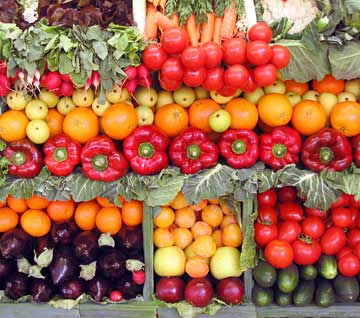
As its name suggests, the Paleo Diet gets its inspiration from the Paleolithic era, when man survived as a hunter-gatherer. The diet, originated by Loren Cordain, health professor at the Colorado State University, is based on a radical line of thought. Professor Cordain argues that since the human genome has not evolved in the last 50,000 years or so, there is reason to believe that the most natural diet for man is what his caveman ancestors ate. In other words, for good health one should survive on fish, meats and eggs from grass-fed and naturally raised livestock, vegetables, roots, fruits and berries, nuts and seeds.
What Is The Paleo Diet
The foods omitted from this diet include every food item that was added on to the human diet after the advent of the agricultural age. These include dairy, grains, legumes, sugar, added salt, processed meats and all kinds of refined foods. Beyond specifying which foods are 'in' and which ones are 'out', the Paleo Diet does not impose severe restrictions on the proportions in which foods should be eaten, and what is best at what time of the day. After all, it is hard to imagine cavemen regulating such details of their diet!
While the rationale behind the Paleo Diet for weight loss has its fair share of doubters, it is hard to deny its health advantages. To begin with, by omitting sweets and refined foods and emphasizing on natural foods, it automatically ensures that one's meals are not calorie-rich or nutrient-deficient. If you were dependent on calorie-rich processed foods before, you will invariably bring down your calorie consumption, improve your metabolism and even lose weight.
Benefits
The Paleo Diet is also rich in both fiber and proteins, which have excellent health benefits. To begin with, both these ingredients keep you feeling full and satisfied for longer, so you are less likely to overeat. Besides, proteins are what help retain and develop your muscle mass, which in turn keeps your metabolism going. The diet is also naturally low in carbohydrates. In fact, it only provides your body with the right kind of carbohydrates, and enough of them for an average person's requirements. For people who want to lose a serious amount of weight with the Paleo Diet, it is recommended that they go slow on high-sugar fruits.
Problems With The Diet
The major criticism of this diet revolves around its inconvenience. First of all, naturally raised meats and eggs and natural oils are expensive, and a lot of people cannot afford them on a daily basis. Also, the diet is rather extreme and will make most people feel severely restricted and even stifled. Imagine giving up pasta, breads, rice, cereals, sausages, bacon, potatoes, dairy and cheese, legumes and beans, as well as juices, coolers and alcoholic beverages altogether. Rather than weight loss, the Paleo Diet is more likely to cause depression, withdrawal symptoms, uncontrolled binges and a lot of guilt.
It is more advisable to take a practical approach to this diet and limit your consumption of agricultural, dairy and refined food products, rather than trying to give them up completely. Also keep in mind that whole grains and dairy offer some vital nutrients to your body and are quite healthy in their own right. It is unfair to club them with refined foods, alcohol and sugar. At the end of the day, there is no doubt that the Paleo Diet can work for weight loss, but the question is can you handle the challenge of such an extreme diet? You are free to publish this article without any change in the content electronically, in print, in your e-book, or on your web site, free of charge, as long as the author resource details are included.


 As its name suggests, the Paleo Diet gets its inspiration from the Paleolithic era, when man survived as a hunter-gatherer. The diet, originated by Loren Cordain, health professor at the Colorado State University, is based on a radical line of thought. Professor Cordain argues that since the human genome has not evolved in the last 50,000 years or so, there is reason to believe that the most natural diet for man is what his caveman ancestors ate. In other words, for good health one should survive on fish, meats and eggs from grass-fed and naturally raised livestock, vegetables, roots, fruits and berries, nuts and seeds.
As its name suggests, the Paleo Diet gets its inspiration from the Paleolithic era, when man survived as a hunter-gatherer. The diet, originated by Loren Cordain, health professor at the Colorado State University, is based on a radical line of thought. Professor Cordain argues that since the human genome has not evolved in the last 50,000 years or so, there is reason to believe that the most natural diet for man is what his caveman ancestors ate. In other words, for good health one should survive on fish, meats and eggs from grass-fed and naturally raised livestock, vegetables, roots, fruits and berries, nuts and seeds. 
 Like most of us, you have probably been down the path of multiple diets from low carbohydrate diets to celebrity diets and more. You may read health magazines that promote health tips to lose weight and like to read headlines that promise you information on how to lose weight fast. Chances are that you have found success with some of these diets and chances are even higher that you have put this weight back on and possibly even more. Your dreams of becoming thin get pushed aside at the same time that your skinny jeans turn into your tight jeans.
Like most of us, you have probably been down the path of multiple diets from low carbohydrate diets to celebrity diets and more. You may read health magazines that promote health tips to lose weight and like to read headlines that promise you information on how to lose weight fast. Chances are that you have found success with some of these diets and chances are even higher that you have put this weight back on and possibly even more. Your dreams of becoming thin get pushed aside at the same time that your skinny jeans turn into your tight jeans. 




